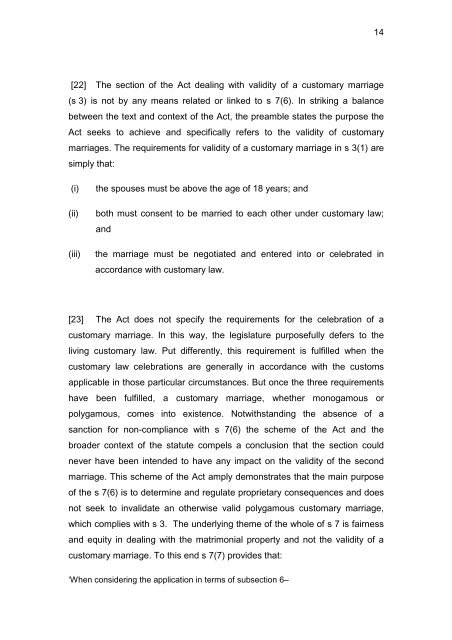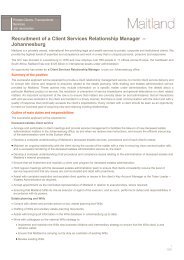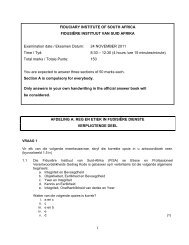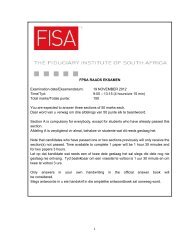Ngwenyama v Mayelane wedding after customary wedding
Ngwenyama v Mayelane wedding after customary wedding
Ngwenyama v Mayelane wedding after customary wedding
Create successful ePaper yourself
Turn your PDF publications into a flip-book with our unique Google optimized e-Paper software.
14<br />
[22] The section of the Act dealing with validity of a <strong>customary</strong> marriage<br />
(s 3) is not by any means related or linked to s 7( 6). In striking a balance<br />
between the text and context of the Act, the preamb le states the purpose the<br />
Act seeks to achieve and specifically refers to the validity of <strong>customary</strong><br />
marriages. The requirements for validity of a custo mary marriage in s 3(1) are<br />
simply that:<br />
(i)<br />
(ii)<br />
the spouses must be above the age of 18 years; and<br />
both must consent to be married to each other under <strong>customary</strong> law;<br />
and<br />
(iii) the marriage must be negotiated and entered into or celebrated in<br />
accordance with <strong>customary</strong> law.<br />
[23] The Act does not specify the requirements for the celebration of a<br />
<strong>customary</strong> marriage. In this way, the legislature pu rposefully defers to the<br />
living <strong>customary</strong> law. Put differently, this require ment is fulfilled when the<br />
<strong>customary</strong> law celebrations are generally in accorda nce with the customs<br />
applicable in those particular circumstances. But o nce the three requirements<br />
have been fulfilled, a <strong>customary</strong> marriage, whether monogamous or<br />
polygamous, comes into existence. Notwithstanding t he absence of a<br />
sanction for non-compliance with s 7(6) the scheme of the Act and the<br />
broader context of the statute compels a conclusion that the section could<br />
never have been intended to have any impact on the validity of the second<br />
marriage. This scheme of the Act amply demonstrates that the main purpose<br />
of the s 7(6) is to determine and regulate propriet ary consequences and does<br />
not seek to invalidate an otherwise valid polygamou s <strong>customary</strong> marriage,<br />
which complies with s 3. The underlying theme of t he whole of s 7 is fairness<br />
and equity in dealing with the matrimonial property and not the validity of a<br />
<strong>customary</strong> marriage. To this end s 7(7) provides tha t:<br />
‘When considering the application in terms of subse ction 6–



![Motsepe v Khoza customary marriage and child[3]](https://img.yumpu.com/44777240/1/184x260/motsepe-v-khoza-customary-marriage-and-child3.jpg?quality=85)


